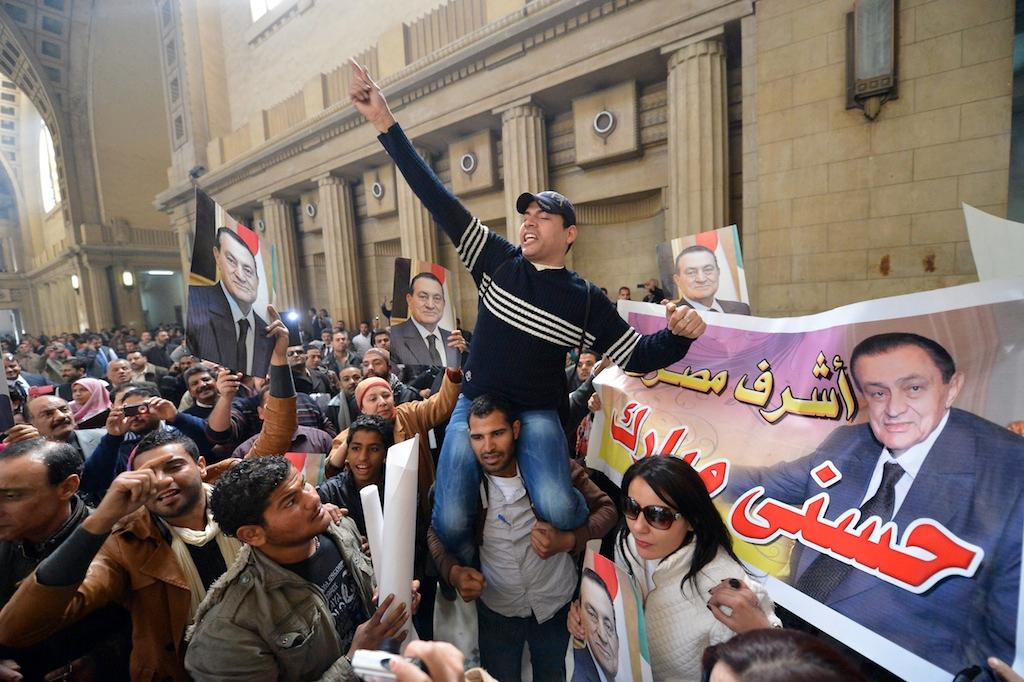New trial for Egypt’s Hosni Mubarak
Supporters of ex-president Hosni Mubarak celebrate after the court of Cessation, Egypt’s top appeals court, accepted an appeal for a retrial of the ousted president in Cairo on Jan. 13, 2013.
CAIRO, Egypt — Egypt's top appeals court overturned ousted President Hosni Mubarak's guilty verdict and life sentence for killing protesters, and ordered a new trail that promises renewed political turmoil.
Mubarak's defense sought the appeal hoping for an acquittal, while the prosecution appealed the original verdict looking for a harsher ruling, The New York Times points out.
Mubarak and Habib Adli, his interior minister, are charged for their alleged part in the deaths of more than 850 protesters during the 2011 revolution.
"The previous ruling was unfair and illegal," Mubarak's lawyer Yousry Abdelrazeq told The Los Angeles Times. "The case was just a mess and there was no evidence against Mubarak."
GlobalPost's senior correspondent in Cairo, Erin Cunningham, says a Mubarak retrial could rock the country, which is about to mark two years since its uprising.
"A retrial of Mubarak certainly has the potential to open old wounds of the uprising, particularly if it looks like Mubarak and his interior ministry aides will receive lighter sentences for the crimes," she explains.
"Many Egyptians were disappointed with the original verdict — a life sentence for ‘failing to prevent’ protester deaths, rather than being directly responsible — but had moved on with the expectation that Mubarak, 84 and ailing, would die in prison," Cunningham says.
"But as President Mohamed Morsi consolidates power, and a new constitution enshrines the right of the military to try civilians, it feels to many like the revolution was for naught," she adds. "That mix could prove explosive ahead of parliamentary elections in the coming months. And Egyptians have not yet abandoned protests and even violent street battles as a political tactic or way of venting political frustration."
Mubarak's poor health will likely be an issue during the investigation. He has been back and forth from his prison cell and the hospital many times. Last year, Egypt's state news agency wrongly reported Mubarak had a stroke and died.
The retrial could make life difficult for President Morsi, who is struggling with a crippled economy and protests now directed at his office. However, on the former issue, good news broke Monday.
European Union President Herman Van Rompuy said after talks with Morsi that Egypt would receive financial support.
"The European Union and associated financial institutions have offered an amount of more than 5 billion euros, or more than 6.5 billion dollars, in grants, concessional loans and loans for a period of 2012 and 2013 to support Egypt's democratic transition," Van Rompuy said.
A boost from the EU is a boost for Morsi, Cunningham says.
"The president needs the international community, including Europe, which is Egypt’s primary trading partner, to lend credibility to his embattled government that's increasingly coming under fire for repressive tactics and mismanagement at home," GlobalPost's Cairo correspondent added.
Follow Erin Cunningham @erinmcunningham, who contributed from Cairo.
Every day, reporters and producers at The World are hard at work bringing you human-centered news from across the globe. But we can’t do it without you. We need your support to ensure we can continue this work for another year.
Make a gift today, and you’ll help us unlock a matching gift of $67,000!
